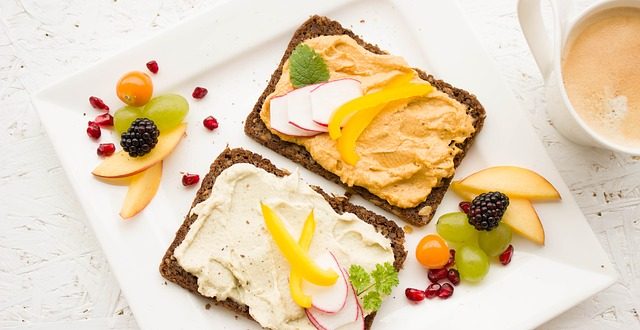We hear it time and time again that to stay healthy we must eat a well-balanced diet, but what exactly does that mean? It’s easy to get confused about what is truly good for you. Is coffee healthy or not? Should I eat less or more carbohydrates? Do I eat enough protein? Though I believe we each have to find out what is best for our bodies, there are some basics that seem to serve most people. Here are some nutrition basics for better health and well-being.
Nutritional Basics for Better Health and Well-Being #1: Keep It Simple But Creative
Keeping your diet simple helps you to steer clear of getting overwhelmed with meal plans and shopping trips. That said, if you are a parent you might want to get a little creative so they stay interested in healthy foods. Kids can be picky about everything, but vegetables seem to be the worst. First, check your own attitude about them and make sure you haven’t given them a negative example.
Nutritional Basics For Better Health And Well-Being #2: Limit Processed Sugar
 Our food can have a huge effect on our dental health as well as other body systems. This makes it even more important to pay attention to your family’s sugar intake. Even if you cut the sugar down to the minimum and regularly brush teeth, acids and natural sugars can still erode teeth, causing decay. I know I have been shocked by many dentist visits when I thought my kids were taking care of their teeth. Because of the tendency to eat more sugar than adults, I have always kept Full Coverage Dental Insurance to keep the financial strain down. That said, I do recommend monitoring your kids’ diet closely to prevent the damage.
Our food can have a huge effect on our dental health as well as other body systems. This makes it even more important to pay attention to your family’s sugar intake. Even if you cut the sugar down to the minimum and regularly brush teeth, acids and natural sugars can still erode teeth, causing decay. I know I have been shocked by many dentist visits when I thought my kids were taking care of their teeth. Because of the tendency to eat more sugar than adults, I have always kept Full Coverage Dental Insurance to keep the financial strain down. That said, I do recommend monitoring your kids’ diet closely to prevent the damage.
Nutritional Basics For Better Health And Well-Being #3: Have You Eaten Your 5 A Day?
 Evidence has shown that eating five portions of fruit and veggies a day can help prevent serious diseases like diabetes, cancer, and strokes. Eating this kind of fiber also helps your digestive system stay fit and flowing as it should. If fresh fruit and vegetables aren’t popular food options for your family, consider adding them to smoothies, milkshakes, and casseroles. The internet is a fantastic resource for creative recipe ideas.
Evidence has shown that eating five portions of fruit and veggies a day can help prevent serious diseases like diabetes, cancer, and strokes. Eating this kind of fiber also helps your digestive system stay fit and flowing as it should. If fresh fruit and vegetables aren’t popular food options for your family, consider adding them to smoothies, milkshakes, and casseroles. The internet is a fantastic resource for creative recipe ideas.
Nutritional Basics For Better Health And Well-Being #4: Protein
 Protein is essential for the body to grow and repair itself. It is also excellent for weight control as it is harder to digest than other food groups – making you feel fuller longer. Fortunately, we all have many options for quality protein, such as fish, meats, nuts, legumes, and fresh vegetables. So, even if you choose not to eat animal products, you can get your daily allowance of protein.
Protein is essential for the body to grow and repair itself. It is also excellent for weight control as it is harder to digest than other food groups – making you feel fuller longer. Fortunately, we all have many options for quality protein, such as fish, meats, nuts, legumes, and fresh vegetables. So, even if you choose not to eat animal products, you can get your daily allowance of protein.
Protein Sources
Fish is a good source of protein and contains many vitamins and minerals, including omega 3, which is great for brain function. Aim to eat two portions of fish a week and make one of the portions an oily fish to make the most of the fatty acids oily fish contains.
Another main source of protein is meat. Meat also contains vitamins and minerals. Meat is the main source of iron and vitamin B12. Vitamin B12 is essential for keeping the body’s nerve and blood cells healthy. It is also important for DNA. A lack of vitamin B12 causes weakness and fatigue due to a diminished ability to carry oxygen to cells. However, choose lean cuts of meat to reduce the amount of saturated fat consumed.
Vegetarian Proteins
For vegetarians or anyone who wants to reduce the amount of meat they eat and increase protein, nuts are an excellent source. Beans and pulses are also packed with protein, as well as other useful nutrients. If you can tolerate them, dairy products are another excellent source, such as eggs, cheese, and yogurt.
Nutritional Basics For Better Health And Well-Being #5: Carbohydrates
 Carbohydrates are a key form of energy for the body. There are two forms of carbohydrate sugars and starches. The sugary carbohydrates are the more troublesome of the two for most people. Eating too much can cause a sluggish digestive system and weight gain. These foods like cookies, cake, candy, alcohol give you energy but are also high in calories and fats.
Carbohydrates are a key form of energy for the body. There are two forms of carbohydrate sugars and starches. The sugary carbohydrates are the more troublesome of the two for most people. Eating too much can cause a sluggish digestive system and weight gain. These foods like cookies, cake, candy, alcohol give you energy but are also high in calories and fats.
Starches, such as whole-grain bread, potatoes, and pasta can be a good source of unrefined carbohydrates if you do not have a gluten intolerance. These types of foods contain more vitamins and minerals, fill you up longer, and keep bowels healthy due to high fiber content.
Nutritional Basics For Better Health And Well-Being #6: Fats and Oils
 Fats are not all bad, in fact, they are an essential addition to a well-balanced, healthful diet. Fats should be consumed in small amounts, however. It is also best to stay away from saturated fats as much as possible. Unsaturated fats are found in nuts, seeds, olive oils, and oily fish. Unsaturated fats help promote a healthy nervous system and brain function. Saturated fats are a known cause of high cholesterol.
Fats are not all bad, in fact, they are an essential addition to a well-balanced, healthful diet. Fats should be consumed in small amounts, however. It is also best to stay away from saturated fats as much as possible. Unsaturated fats are found in nuts, seeds, olive oils, and oily fish. Unsaturated fats help promote a healthy nervous system and brain function. Saturated fats are a known cause of high cholesterol.
Nutritional Basics For Better Health And Well-Being #7: Supplements
You want to try and get your vitamins and minerals from a healthy diet, but if you’re struggling to reach any of your targets, supplements can make up the difference. There are many varieties available at varying prices and quality. Do your research for the best deals and potency. Do also ask your doctor for recommendations based on labs. You may find that purchasing vitamin or combinations like Kyani Team Genesis gives you more of what you need for a better price. Just make sure to read the labels thoroughly and take them as directed.
**** This post is strictly informational and is not meant to replace the advice of your health care provider. Women’s lifelink, it’s owners, administrators, contributors, affiliates, vendors, authors and editors do not claim that this information will diagnose, treat, or improve any condition or disease.
 Women's Life Link Be Well, Be Happy, Be YOU!
Women's Life Link Be Well, Be Happy, Be YOU!





